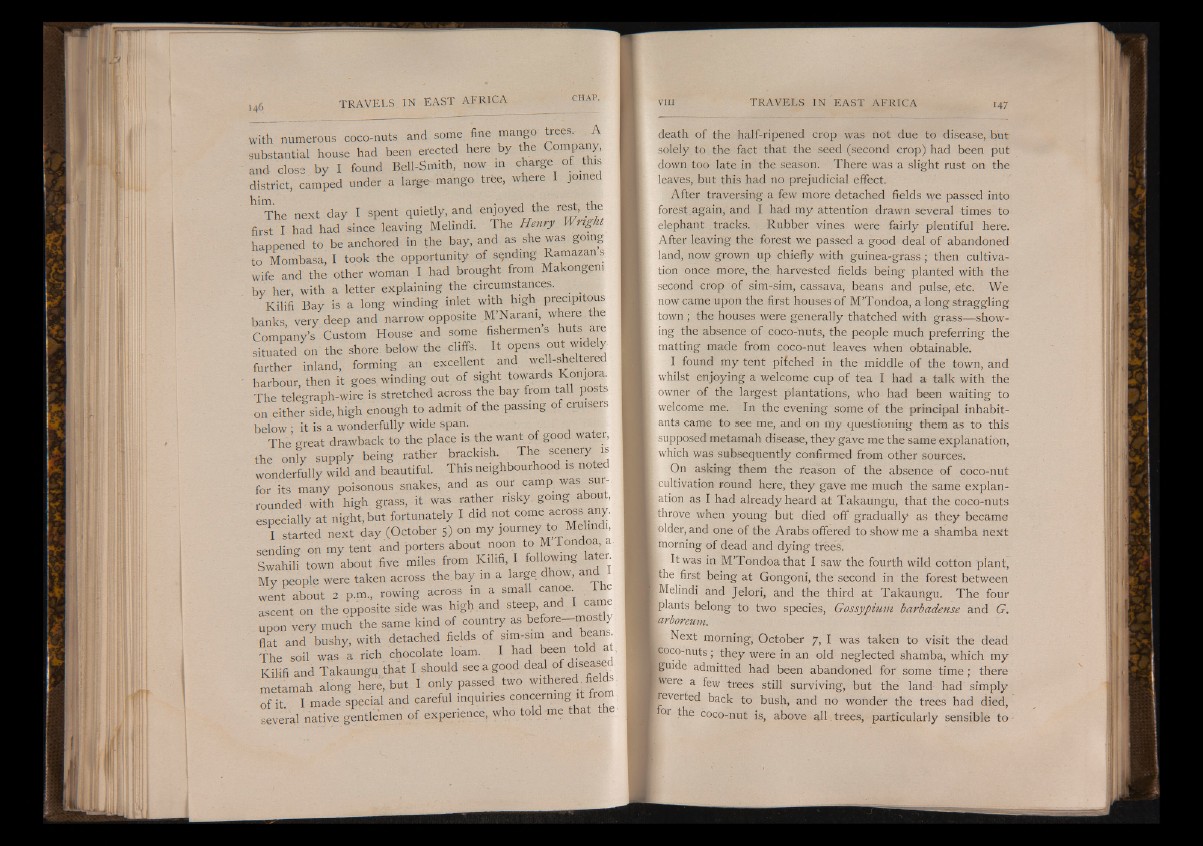
With numerous coco-nuts and some fine mango trees,
substantial house had been erected here by the Company,
and close by I found Bell-Smith, now in charge of this
district, camped under a large mango tree, where joine
"The next day I spent quietly, and enjoyed the rest, the
first I had had since leaving Melmdi. The Henry Wright
happened to be anchored in the bay, and as she was going
to Mombasa, I took the opportunity of seeding Ramazan.s:
wife and the other woman I had brought from Makongem
bv her, with a letter explaining the circumstances.
Kilifi Bay is a long winding inlet with high precipitous
banks, very deep and narrow opposite M’Naranr where the
Company’s Custom House and some fishermens huts are
situated on the shore, below the cliffs. It opens ou.widely
further inland, forming an excellent and well-sheltered
' harbour, then it goes winding out of s i g h ® v y a V # ^ ^ ;
The telegraph-wire is stretched across the bay from tall post
on either side, high enough to admit of the passing of cruisers
below ; it is a wonderfully wide span. ' .
The great drawback to the place is the want of good water,
the only supply being rather brackish. The scenery is
wonderfully wild and beautiful. This neighbourhood is noted
for its many poisonous snakes, and as our camp was^ r- I
rounded with high grass, it was rather risky, going a .JB,
especially at night, but fortunately I did not come across any.
I started next day (October S) on my joumey to Melmd ,
sending on my tent and porters about noon to M Tondoa, a
Swahili town about five miles from Kilifi I following later |
My people were taken across the bay in a large d ow’ an
w L about 2 p.m., rowing across in a small canoe. The
ascent on the opposite side was high and steep, and I came
upon very much the same kind of country as before-mostly
Sat and bushy, with detached fields of sim-s.m
The soil was a rich chocolate loam. I had been tol U
Kilifi and Takaungu that I should see a good deal of disease
metamah along here, but I only passed two withered fiel
of it. I made special and careful m q u u i e s concemmg it from
several native gentlemen o f experience, who told me
death of the half-ripened crop was not due to disease, but
solely to the fact that the seed (second crop) had been put
down too late in the season. There was a slight rust on the
leaves, but this had no prejudicial effect.
After traversing a few more detached fields iye passed into
forest again, and I had my attention drawn several times to
elephant tracks. Rubber vines were fairly plentiful here.
After leaving the forest we passed a good deal of abandoned
land, now grown up chiefly with guinea-grass ; then cultivation
once more, the harvested fields being planted with the
second crop of sim-sim, cassava, beans and pulse, etc. We
now came upon the first houses of M’Tondoa, a long straggling
town ; the houses were generally thatched with grass— showing
the absence of coco-nuts, the people much preferring the
matting made from coco-nut leaves when obtainable.
I found my tent pifched in the middle of the town, and
whilst enjoying a welcome cup of tea I had a talk with the
owner of the largest plantations, who had been waiting to
welcome me. In the evening some of the principal inhabitants
came to see me, and on my questioning them as to this
supposed metamah disease, they gave me the same explanation,
which was subsequently confirmed from other sources.
On asking them the reason of the absence of coco-nut
cultivation round here, they gave me mudi the same explanation
as I had already heard at Takaungu, that the coco-nuts
throve when young but died off gradually as they became
Solder, and one of the Arabs offered to show me a shattlba next
morning of dead and dying trees.
It was in M’Tondoa that I saw the fourth wild cotton plant,
the first being at Gongoni, the second in the forest between
I^lelindi and Jelori, and the third at Takaungu. The four
^plants belong to two species, Gossypium barbadense and G.
■¡arboreum.
\ Next morning, October 7, I was taken to visit the dead
Coco-nuts; they were in an old neglected shamba, which my
Buide admitted had been abandoned for some time; there
frere a few trees still surviving, but the land had simply
reverted back to bush, and no wonder the trees had died,
Qr the coco-nut is, above all trees, particularly sensible to